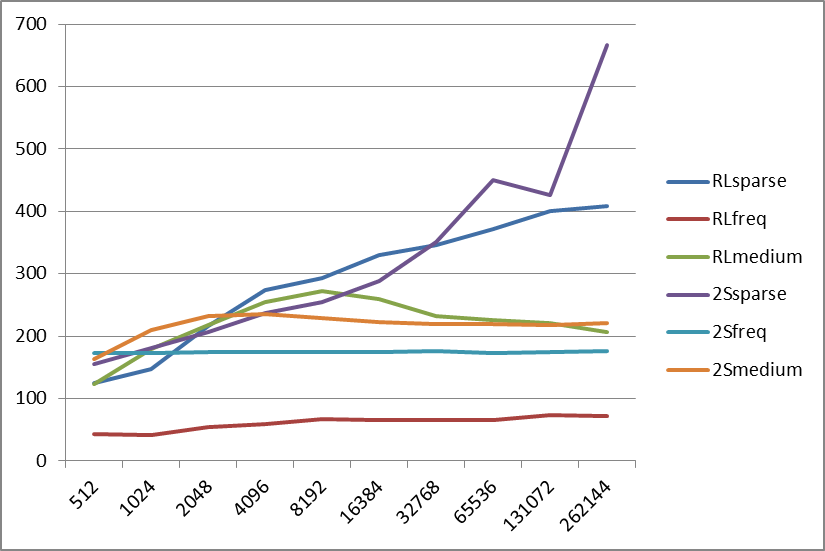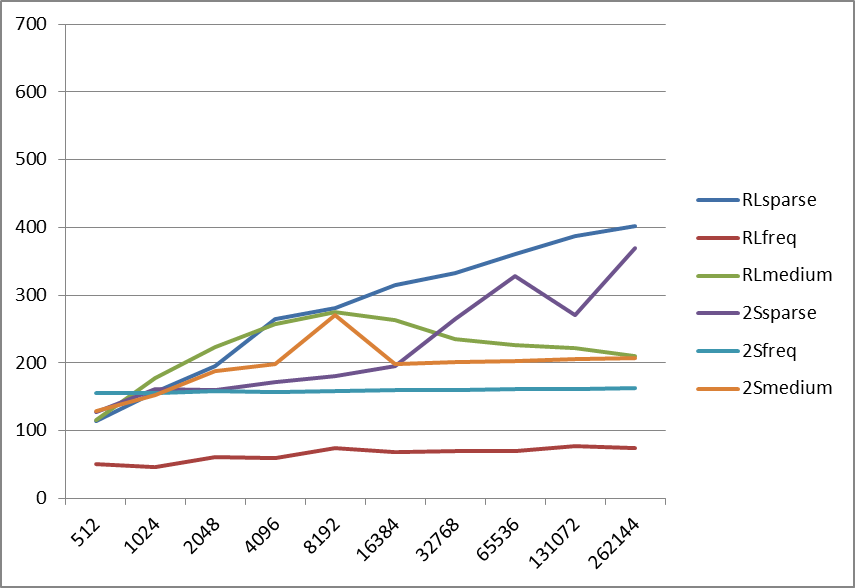EDIT:
After a request for 'medium' amounts of duplication (the random numbers are taken from a pool of 1024 instead of just 10):
RLsparse,124.211,147.412,216.475,273.934,293.235,330.671,346.458,372.003,399.730,407.985
RLfreq,42.496,41.446,53.732,58.305,66.281,65.889,64.953,66.078,73.901,71.291
RLmedium,122.813,179.644,218.106,253.908,272.583,259.016,232.671,226.121,220.121,207.180
2Ssparse,155.091,180.669,205.877,236.890,254.193,288.193,351.495,450.381,426.626,665.759
2Sfreq,172.426,173.460,173.988,174.462,175.049,174.477,175.384,172.826,174.230,175.976
2Smedium,162.969,210.496,232.372,235.070,229.555,222.412,219.141,219.358,218.502,221.412
And the corresponding plot is:

package dupcnt;
import java.util.Arrays;
import java.util.HashSet;
import java.util.Random;
import java.util.Set;
public class CompareDups {
public static void main(String[] args) {
System.out.println("Building Data");
int[] sparse = new int[1<<18];
int[] freq = new int[sparse.length];
int[] medium = new int[sparse.length];
Random rand = new Random(1); // repeatable 'random' numbers
for (int i = 0; i < sparse.length; i++) {
sparse[i] = rand.nextInt(sparse.length);
}
for (int i = 0; i < freq.length; i++) {
freq[i] = rand.nextInt(10);
}
for (int i = 0; i < medium.length; i++) {
medium[i] = rand.nextInt(1024);
}
System.out.println("Built data " + sparse.length);
final int dpoints = 5;10;
int[] iterations = new int[dpoints];
for (int i = 0; i < iterations.length; i++) {
iterations[i] = 1 << dpoints + 3 - i;
}
for (int i = 0; i < 10; i++) {
long[][] data = new long[6][dpoints];long[8][dpoints];
for (int dp = 0; dp < dpoints; dp++) {
int[] input = null;
input = Arrays.copyOf(sparse, sparse.length >>> dpoints - 1 - dp);
data[4][dp]data[0][dp] = processRL(input.length;, iterations[dp]);
data[5][dp]data[3][dp] = iterations[dp];process2S(input, iterations[dp]);
data[0][dp]input = Arrays.copyOf(freq, freq.length >>> dpoints - 1 - dp);
data[1][dp] = processRL(input, iterations[dp]);
data[2][dp]data[4][dp] = process2S(input, iterations[dp]);
input = Arrays.copyOf(freqmedium, sparsemedium.length >>> dpoints - 1 - dp);
data[1][dp]data[2][dp] = processRL(input, iterations[dp]);
data[3][dp]data[5][dp] = process2S(input, iterations[dp]);
data[6][dp] = input.length;
data[7][dp] = iterations[dp];
}
String[] series = {"RLsparse", "RLfreq", "RLmedium", "2Ssparse", "2Sfreq", "2Smedium", "datasize", "iterations"};
for (int s = 0; s < series.length; s++) {
StringBuilder sb = new StringBuilder();
sb.append(series[s]);
for (long l : data[s]) {
if (s < 46) {
sb.append(",").append(String.format("%.3f", l/1000000.0));
} else {
sb.append(",").append(String.format("%d", l));
}
}
System.out.println(sb.toString());
}
}
}
private static long processRL(final int[] input, final int iterations) {
System.gc();
int cnt = 0;
long nanos = System.nanoTime();
for (int i = 0; i < iterations; i++) {
cnt += findDuplicates(input).length;
}
if (cnt < 0) {
throw new IllegalStateException("This is just to keep things from being optimized out.");
}
return System.nanoTime() - nanos;
}
private static long process2S(final int[] input, final int iterations) {
System.gc();
int cnt = 0;
long nanos = System.nanoTime();
for (int i = 0; i < iterations; i++) {
cnt += findEvenOccurrences(input).size();
}
if (cnt < 0) {
throw new IllegalStateException("This is just to keep things from being optimized out.");
}
return System.nanoTime() - nanos;
}
}


